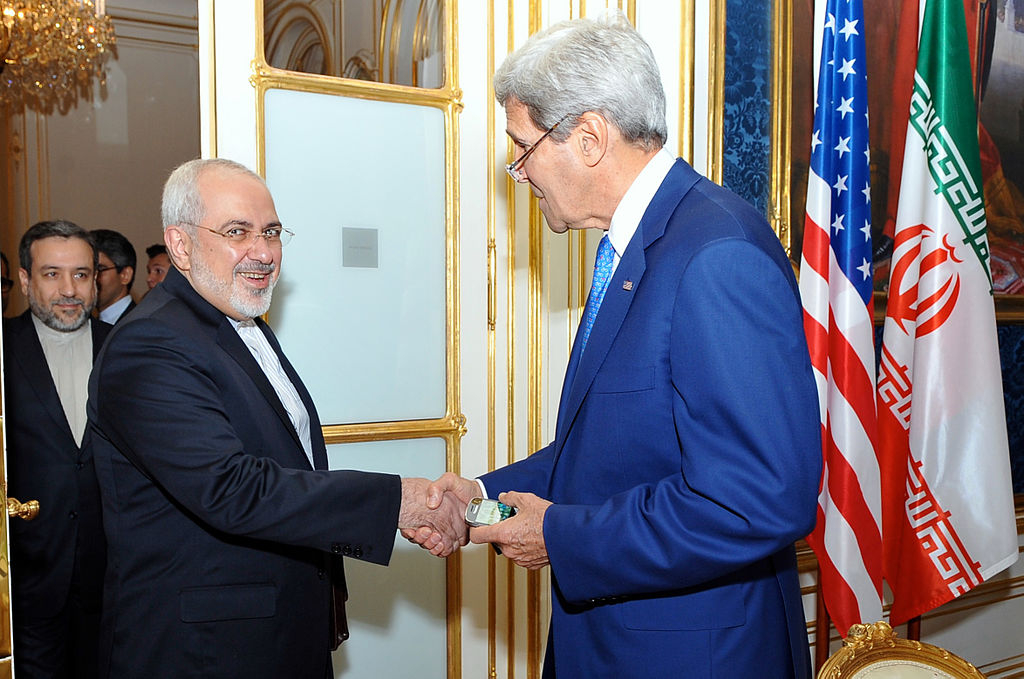 Iranian authorities adopted deception as a national policy by promoting the narrative of aversion to nuclear weapons to the world while embracing and furthering their nuclear activities privately. Some world leaders bought Iran's lie and began pressing others to follow suit. Pictured: Then US Secretary of State John Kerry shakes hands with Iranian Foreign Minister Mohammad Javad Zarif in Vienna, Austria, on July 14, 2014. (Image source: US State Department) |
In the world we live in where many things are certain, one of them is the Iranian regime's recent efforts to invoke a fatwa in an attempt to deceive the West. The declaration of a fatwa by Iran's Supreme Leader, Ayatollah Ali Khamenei, to serve as "proof" that Tehran is not pursuing nuclear weapons is a move both mischievous and clever.
Recently, the junior Senator from Kentucky, Rand Paul, met with Iran's foreign minister Javad Zarif, who in his deliberations with Senator Paul told him about Iran's unwillingness to seek nuclear weapons because of Khamenei's fatwa.
Iran's Supreme Leaders had been previously quoted as saying:
"We consider the use of such weapons as haraam [religiously forbidden] and believe that it is everyone's duty to make efforts to secure humanity against this great disaster".
Going even further, the Supreme Leader claimed that the production or use of nuclear weapons are governed by Islamic laws which ban them. On his official website, he adds that "Both sharia [Islamic laws] and aqli [related to logic and reason] fatwas dictate that we do not pursue them."
If history is anything to go by, the Supreme Leader's statement is barely worth a pinch of salt. It is notable that that the first time Ayatollah Khamenei issued a fatwa against nuclear weapons took place right after his government was caught red-handed pursuing secret nuclear activities and enriching uranium in two clandestine nuclear sites in Natanz and Arak in 2002 in violation of the Non-Proliferation Treaty (NPT).
Having had their deception found out, the Iranian authorities subsequently adopted deception as a national policy by promoting the narrative of aversion to nuclear weapons to the world while embracing and furthering their nuclear activities privately.
In a letter to the International Atomic Energy Agency (IAEA), for instance, Iran deployed Khamenei's declaration of a fatwa to dodge further discussion about its nuclear program. Iran claimed that "the production, stock-piling, and use of nuclear weapons are forbidden under Islam and that the Islamic Republic of Iran shall never acquire these weapons."
Unsurprisingly, some world leaders bought Iran's lie and began pressing others to follow suit. Former President Barack Obama, for example, in an attempt to appease Tehran and curry the favor of the Iranian mullahs, naively declared in his address to the U.N. General Assembly (September 24, 2013), that "The Supreme Leader has issued a fatwa against the development of nuclear weapons."
As if to echo Obama's statement, former US Secretary of State John Kerry also said:
"The supreme leader... says he has issued a fatwa, the highest form of Islamic prohibition against some activity, and he said that is to prohibit Iran from ever seeking a nuclear weapon."
Former Secretary of State Hillary Clinton also lent her support to the farce by further pushing the narrative of Iran's innocence to the word. According to her:
"The other interesting development which you may have followed was the repetition by the Supreme Leader Ayatollah Khamenei that they would – that he had issued a fatwa against nuclear weapons, against weapons of mass destruction. Prime Minister Erdogan and I discussed this at some length, and I've discussed with a number of experts and religious scholars."
First of all, no one, it seems, has ever laid eyes on this proclaimed fatwa.
Second, if only Clinton, Obama, Kerry or other politicians were smart enough to study the fundamentals of Islam, they would be cognizant of the fact that taqiyya can be a reason to issue fatwas under Shia Islam. Taqiyya, which is particularly emphasized in Shia Islam, is an Islamic juridical term which dictates that lying is allowed when one's interests or the interests of Islamic government or community is under threat. In other words, taqiyya is a type of jihad, the battle to win the fight against the supposed enemies.
For those still willing to grasp at straws by believing the Ayatollah issued a nuclear fatwa, and who know anything about Islam, they would realize that fatwas are not carved in stone; they can be changed at any moment at the discretion of the Muslim leader.
In summary, the quick reference to Ayatollah Khamenei's nuclear fatwa declaration as evidence of Iran's innocence in the nuclear arms race amounts to self-deception. Khamenei's nuclear fatwa is nothing but a phony decree aimed at deflecting attention from Iran's nuclear ambitions and activities. It is designed solely to serve the interests of his umma (Islamic community) and the Islamic Republic.
Dr. Majid Rafizadeh is a business strategist and advisor, Harvard-educated scholar, political scientist, board member of Harvard International Review, and president of the International American Council on the Middle East. He has authored several books on Islam and US foreign policy. He can be reached at Dr.Rafizadeh@Post.Harvard.Edu


